- Home
- Jim Thompson
Cropper's Cabin
Cropper's Cabin Read online
CROPPER’S
CABIN
JIM
THOMPSON
Little, Brown and Company
New York Boston London
Begin Reading
Table of Contents
Preview of Texas by The Tail
Newsletters
Copyright Page
In accordance with the U.S. Copyright Act of 1976, the scanning, uploading, and electronic sharing of any part of this book without the permission of the publisher constitute unlawful piracy and theft of the author’s intellectual property. If you would like to use material from the book (other than for review purposes), prior written permission must be obtained by contacting the publisher at [email protected]. Thank you for your support of the author’s rights.
1
It was almost dusk, and I knew that meant she’d be waiting for me, her car hidden under the thick willows, waiting just like she had been all along. It was a swell setup.
Her name was Donna. She was one-fourth Indian and three-fourths white, and that’s a blood mixture that’s hard to beat if you’re breeding for beauty. She had the beauty, all right—and plenty more. She could also mean plenty of trouble, if anybody found out about us.
I finished what I was doing and was beginning to feel that don’t-give-a-gol-darn crankiness that sneaks up on me when I get real hungry. You know. Maybe you get the same way. You almost hope that someone’ll say something to you so you can jump down his throat.
I put the papers in a folder marked
Miss Trumbull (English Department)
Burdock County, Oklahoma
Consolidated School District
and started to slide it into the top drawer of Miss Trumbull’s desk. Somehow, one of the papers slipped out and fell into the wastebasket; and when I lifted it out I saw this sandwich—part of a sandwich, rather, lying there. It was made out of some kind of fish mixed up with salad dressing and there were little pinkish smears of lipstick on it and a place where spit had hardened. But it smelled awfully good; it looked awfully good. I pinched at it, pinching away the spit and the lipstick. And then, suddenly the classroom door banged open and I shoved the sandwich into my pocket.
It was Abe Toolate, the janitor. I stood up, trying to smile, and he came toward me, his mean little eyes fixed on mine. He stopped right in front of me, so close that I was breathing in the stink of corn liquor, and held out one of his stubby copper-skinned hands.
“I seen you,” he grunted. “Let’s have it.”
“Have what?” I said.
“What you put in your pocket. Been wondering who was doin’ all the stealin’ around here at night.”
I almost laughed in spite of myself. Because he was probably the only person around school that was wondering. Everyone else knew; and Abe would have been fired long before if he hadn’t had a couple of relatives on the school board.
“Let’s have it,” he repeated.
“Get away from me,” I said. “Get away from me fast, Abe.”
“What’s your name, boy?” he blustered, as if he didn’t know. “What you doing here, anyhow?” And I could feel my face going tight. Shucks, he knew what I was doing there. I’d been grading Miss Trumbull’s papers for almost four years, ever since I was a freshman.
I walked straight toward him. I kind of herded him in front of me, backing him toward the cloakroom, and his face began shining with sweat.
“N-now, look, Tom—Tommy,” he stuttered. “I didn’t mean…”
“Tommy?” I said. “Aren’t you getting a little familiar, Abe? You mean Mister Carver, don’t you?”
“M-mister Carver…”
He almost choked on that, having to call a white-trash sharecropper’s boy Mister.
I backed him into the cloakroom and stood staring at him a minute or two, watching him sweat and squirm. Then I began to calm down a little, and I wanted to try to patch things up. But I knew there wasn’t any way—not after I’d made him put a handle on my name. So I reached down for my football sweater with the big BCS on it, and left.
I walked down the stairs and out the front door thinking about what a funny thing pride was. What a troublesome thing.
Now that my temper had simmered down, I realized that Abe must have seen what I’d stuck in my pocket. He’d tried to dig me in my pride—to give himself a boost by pushing someone else down—and I’d dug right back at him. So, now, or rather tomorrow, there’d be trouble. He’d be in the principal’s office the first thing in the morning, and I still wouldn’t be able to admit that I’d been going to eat the leavings from Miss Trumbull’s lunch.
I dug the sandwich out of my pocket and dropped it down at the side of the steps. Then I slung my sweater around my shoulders and headed across the yard to the road.
It was getting on toward true dark now, but when I rounded the curve that leads down to the creek I saw Donna Ontime’s new Cadillac parked under the willows. Apparently she spotted me at the same time; she gave two short taps on the horn of the car. So I went on, and it sure wasn’t hard to do even though I knew what would happen if Pa ever caught us together.
2
Before I go any further, perhaps I’d better explain that names like Toolate and Ontime aren’t uncommon in Eastern Oklahoma. You see, most of this land over here used to be owned by the Five Civilized Tribes—I mean, the tribes themselves owned it, not individuals in the tribes. That system was all right during territorial days, but before Oklahoma could become a state the land had to be shared out; they had to do away with tribal ownership. So this is the way the government worked it. They set a certain date, right down to the hour, and any child born before that hour got a share of the tribe’s property. He got an allotment, as the saying is. But if he was born after that hour—even a minute after it—he didn’t get anything. He was just a plain hard-up Indian, unless his kinfolks chose to take care of him.
That’s the story behind names like Toolate and Ontime, and a lot of others that have been switched around so much you can hardly recognize ’em for what they were.
Abe Toolate had been born after the allotment hour, and his kin had soon learned better than to heir him anything.
Matthew Ontime, Donna’s father, had been born into a good allotment, and he’d inherited from most of his family; and now he owned around five thousand acres. If he’d been willing to lease his land for oilwell drilling, he could have been one of the richest men in Oklahoma. And even without oil he was plenty well-off.
In the back seat of the Cadillac, I looked down into Donna Ontime’s smoldering black eyes, and it struck me that I was right on top of, yes, and inside of, more money than you’ll find in a pretty big bank. But I’d have liked her just as well if her father hadn’t had a penny. I might even have liked her more, if that’d been possible.
She smiled, her teeth white and even in the darkness, and cocked her head a little to one side.
“Well, Tommy?”
“Swell,” I said.
“But now you have to go, isn’t that right? You have to go, and you think you’d better walk, despite the fact I have to drive right by your place.”
“Don’t be like that, Donna,” I said. “You know I can’t help the way Pa feels.”
“Never mind, Tommy.”
“But what can I do?” I said. “I’m nineteen years old and I’m still in high school, and if I have to drop out for the spring chopping it may take me another year to finish. I have to get along with Pa, at least until I’m out of school.”
“Just until, then? No longer, Tommy?”
“Well”—I tried to hedge. “What about your father, Donna? I don’t think he’s very fond of us Carvers.”
“I can handle my father.”
“Well, but look! Look, honey,
” I said. “It’s not the same way with me, Donna. I’ve tried to explain to you that if Pa was really my father—if he hadn’t done so much for me—I…”
“I understand.” She held up a hand, one of the fingers bent down. “Item one: Mr. Carver adopted you back in Mississippi after your own parents were drowned in a flood. Item two: His wife died, and rather than abandon you to an orphanage, he adopted Mary to look after you. I might add that the law seems rather loose when a widower can adopt a fourteen-year-old girl, but…”
“I’d rather you didn’t say it,” I said.
“… but it was probably apparent to the authorities that lust, to Mr. Carver, was just a dirty word in the Bible. Let’s see, now, where were we? Oh, yes! Item three: the doctors thought you belonged in a higher, dryer climate, so Mr. Carver left Mississippi and brought you and Mary here.… That’s quite a lot for a man to do, isn’t it? All for the sake of helping an infant, who wasn’t even related to him, to become a man.”
“I think it’s quite a bit, yes,” I said.
“I haven’t overlooked anything?”
I shrugged. “I guess not.”
“But you’ve overlooked something. You were out in the fields doing a man’s work when you were six years old, and you’ve never known anything but work since then. All you’ve got out of life is enough food to keep you working and enough beatings to kill two mules.”
“I’ve got more than that,” I said. “And Pa isn’t really mean. He’s just kind of old-fashioned and strict.”
“I see. Well, that makes everything all right, then.”
“No,” I said, “you don’t see, Donna. But I guess I won’t be able to talk any more about it now. I would like to have you drive me home, though, if…”
“I know. If it wasn’t for Pa.”
“That wasn’t what I was going to say. I was going to say that I could scoot down in the seat and you could drive on past our place and…”
She got up abruptly, not speaking, and slid over into the front seat. She started the motor with a roar, slammed in the gears, and sent the car leaping out of the willows and onto the road. I climbed over into the front seat and scooted down, holding on for dear life. The car was doing eighty by this time, sailing and bouncing over the red-clay ruts. But there wasn’t a thing I could do. She was all-out Indian-mad; and when they get that way, you can’t reason with ’em.
I’d seen her this way just once before; spring a year ago it was, right after she’d finished at the state university. She had a big Chrysler then, and she’d got a flat two-three miles out of the village; and I offered to fix it for her. I knew her, of course, since we share-crop forty acres for Matthew Ontime in addition to our own ten. But it was only in a nodding, good-morning-miss way.
Well, I went to work on the tire, and I don’t know as I said anything—rather, it was what I didn’t say. The way I acted, sort of too-casual, and indifferent. Because when you’ve been raised by a man like Pa, you’re bound to absorb some of his ideas even when you know they’re completely unreasonable. Pa was always telling about how the Five Tribes had been forced out of Georgia and Mississippi and Florida, back in the early 1800’s; and how they should have been crowded right on out into the Pacific Ocean, instead of being allowed to hog onto good land that the white folks needed. He was always saying that they were all streaked with the tar-brush—that they were part nigger. He claimed they were lazy and thieving, loaded with all kinds of dirty diseases. And I’d soon learned better than to argue with him. I’d had to listen and listen, never saying anything back, until his way of thinking had almost become mine.
So, I guess I was pretty off-hand with Donna; insulting without saying or doing anything. Anyway, she took it up to a point, not seeming to notice. And then—and I don’t know how else to put it—she just went crazy. I was hunkered down, sliding the hub-cap into place, when it happened. I heard a moan, the kind you might hear from a hurt-crazy bobcat. Then she had thrown herself at me, knocking me backwards to the road; and she went down on top of me, kicking and pounding and scratching and biting. And I realized, vaguely, that she was actually trying to kill me. But what I was thinking mostly was that even with her black hair tangled and her face smeared with the dirt of the road, she must be the prettiest girl in the world. I was thinking about what she’d be like, what she was bound to be like, under her clothes.
It stopped as suddenly as it had started. There wasn’t any lead-up to it. It was just gone, like a grass fire hit by a flash flood. She went completely motionless, looking at me wide-eyed like she couldn’t believe what had happened. Then she buried her head against my chest and began to cry. I picked her up and set her in the car, and…
Well, that’s the way it started. That’s the way she was. I hope she snapped out of this mad before she wrapped us around a cottonwood.
We went up a rise in the road, I could feel the car shoot upward. Then the brakes went on so hard that I almost slid under the dashboard, and we swung to the left, horn blaring, clear into the ditch. And there was a blinding flash of light and someone yelled, and another horn blared—and I knew we’d almost run down another car. Then, we were back on the road again, still traveling fast but a lot slower than we had been; and Donna laughed softly.
She reached over and pulled my head down into her lap. She scooted forward a little, and I knew she wanted me to put my arms around her hips, so I did. We rode on in silence until we made the turn into Ontime plantation, which was also the turn into our place.
“Perhaps it’s best this way,” she said, thoughtfully, as if she’d been arguing with herself. “I know I wouldn’t like it if you were like the others—kow-towing and falling all over your feet because of the money.”
She’d told me about that, how she’d felt about the university crowd; and I liked her enough—so much—that I’d tried to talk her out of it. I wanted her to have the breaks that she deserved; so I told her again that she might be a little hard on people.
“Perhaps,” she said. “But you can’t help thinking those things. And it’s such a wonderful feeling when you know there’s someone who’s not influenced the least by money, even if…”
“Yes,” I said.
“I’m like Dad, I guess. I’d rather see someone with the wrong principles than no principles at all.”
“Donna, you know…”
“I know.” She lowered a hand from the wheel and stroked my head. “By the way, I think that was your father we passed back there.”
“I thought I recognized his voice,” I said. “Could you tell who he was with?”
“I’m afraid—well, it was a red and white car, darling, so I…”
“Oh, my gosh,” I said, and I sat up.
A red and white car—it was bound to be one of the oil-company scouts. I’d thought they all knew, by now, that they were wasting their time in trying to lease our ten acres because Matthew Ontime wouldn’t lease his, and we were almost spang in the middle of his land. All of ’em should have known it. But, now, here was another one, a new man probably, and he’d be a fast talker like all the lease-hounds were. He’d dangle a fortune in front of Pa, and Pa would ache for it, mainly for what it would mean to me, and he wouldn’t be able to touch it.
At the best, he’d be deep-down bitter for days, twice as hard to live with as he usually was. At the worst…? Well, it would be bad enough if he only tried to talk to Donna’s father. If he only did that.
“I wish I could help, darling. Dad will listen to me about a lot of things, but…”
“You mustn’t try to talk to him,” I said. “He’d wonder why you were interested, and—well, anyway, I think he’s right. He doesn’t need money. There’s no reason why he should lease just to accommodate Pa.”
“I would.” She hesitated. “If I could persuade Dad to give me my inheritance now…”
“Let’s not talk about it.” I said.
“No,” she nodded, slowly, “perhaps we’d better not. Shall I drive on past your house, Tommy
?”
“No need,” I said. “Mary won’t say anything.”
She throttled the Cadillac down, glancing up into the rearview mirror to make sure that the oil-company car was still out of sight.
“Mary knows about us, doesn’t she, Tommy?”
“Well… she knows I’m with you whenever I can be. I’ve had to have her cover up for me a time or two, and…”
“She hates me, Tommy.”
“Why, that’s crazy!” I laughed. “She feels like she has to go along with Pa on everything, sure. You might say she hasn’t got a real will of her own, and probably she acts like…”
“It wasn’t acting. I’ve seen her in town a few times, with your father, and she’s looked at me and…” Her voice trailed off.
“You’re imagining things,” I said, and I opened the door of the car.
“Tommy. How old is she?”
“Around thirty-three, I guess. She was somewhere around fourteen or fifteen when Pa took her in.”
“She’s never gone with anyone? Any men?”
“No. Maybe she’s been too afraid of Pa, but I kind of think she’s never been interested.”
“Strange, isn’t it? And she’s—she could be quite attractive.”
“She looks all right, I guess,” I said shortly, because somehow I was getting uncomfortable. “I’ll have to go now, Donna.”
“But,” she looked up into the mirror. “Yes, I guess you’d better. Try to keep him from coming over to our house, darling. I’m always afraid he—that he and Dad might—And it would change us, Tommy! We wouldn’t want it to, but…”
“I’ll try. God knows I’ll do my best,” I said.
She kissed me quickly and then drove away. I ran crouching across the road to the house.
It was, well, I don’t know how many times it was that I’d seen her. But now that she was gone, it seemed as incredible as it had the first time. It was hard to believe that it had happened. She had everything, she was everything a man could want.

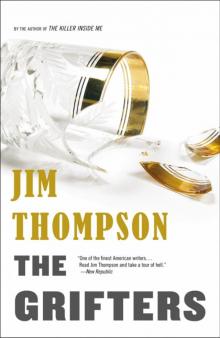 The Grifters
The Grifters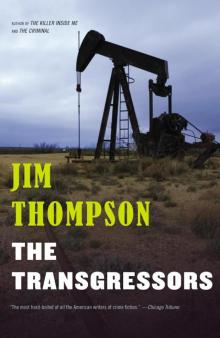 The Transgressors
The Transgressors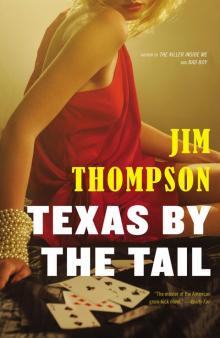 Texas by the Tail
Texas by the Tail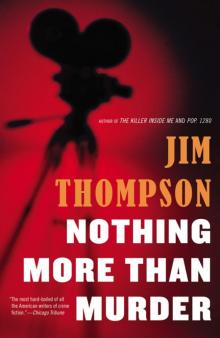 Nothing More Than Murder
Nothing More Than Murder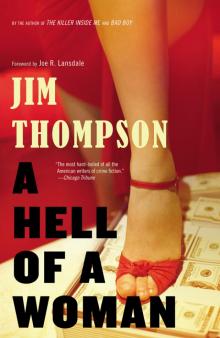 A Hell of a Woman
A Hell of a Woman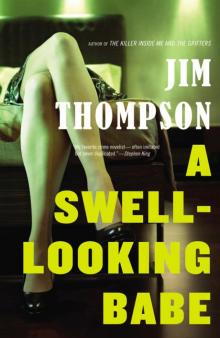 A Swell-Looking Babe
A Swell-Looking Babe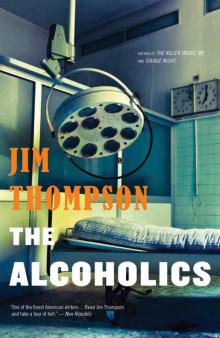 The Alcoholics
The Alcoholics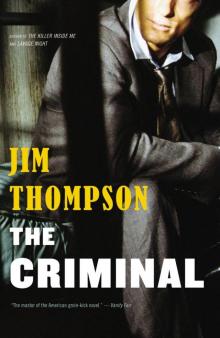 The Criminal
The Criminal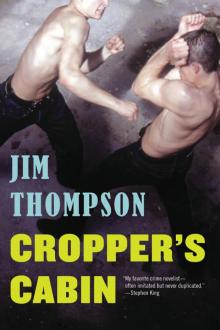 Cropper's Cabin
Cropper's Cabin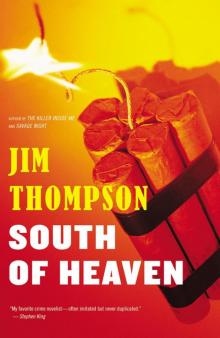 South of Heaven
South of Heaven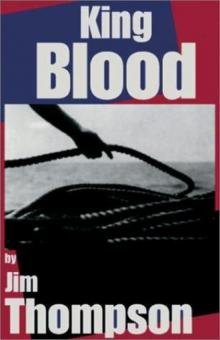 King Blood
King Blood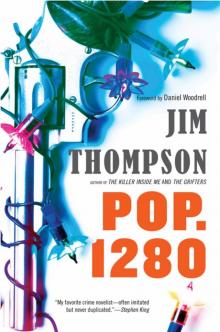 Pop. 1280
Pop. 1280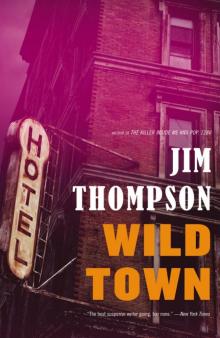 Wild Town
Wild Town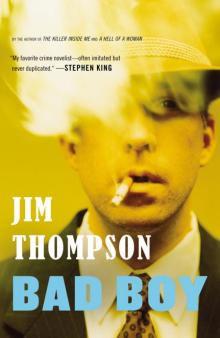 Bad Boy
Bad Boy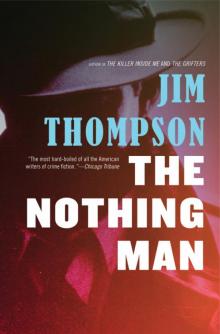 The Nothing Man
The Nothing Man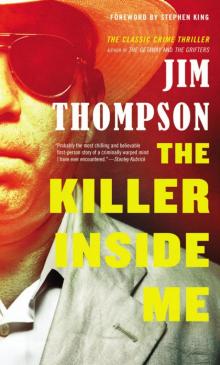 The Killer Inside Me
The Killer Inside Me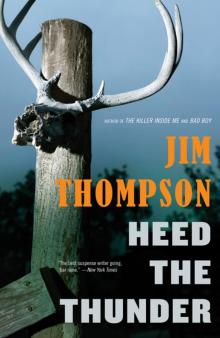 Heed the Thunder
Heed the Thunder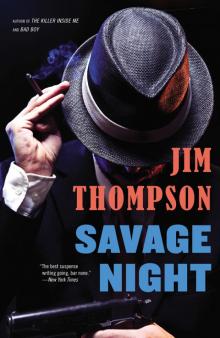 Savage Night
Savage Night Recoil
Recoil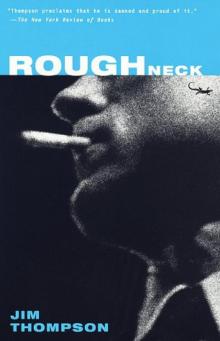 Roughneck
Roughneck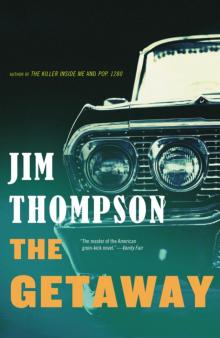 The Getaway
The Getaway